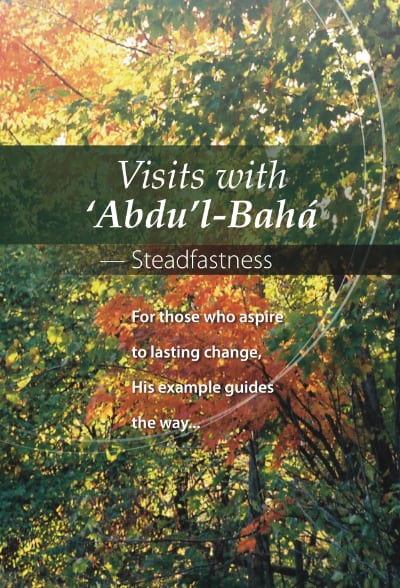
Steadfastness
This presentation of stories about ‘Abdu’l-Bahá was created for the occasion of the centenary of His passing. It includes stories about encounters with ‘Abdu’l-Bahá and other prayers and devotional readings drawn from His writings.
The presentation is also available for download as a PDF or as a printed pamphlet
Further information about this period is in the Ascension of ‘Abdu’l-Bahá section of Bahai.ca.
When ‘Abdu’l-Bahá was in New York, He called to him an ardent Bahá’í and said, “If you will come to Me at dawn tomorrow, I will teach you to pray.” Delighted, Mr. M arose at four and crossed the city, arriving for his lesson at six. With what exultant expectation he must have greeted this opportunity! He found ‘Abdu’l-Bahá already at prayer, kneeling by the side of the bed. Mr. M followed suit, taking care to place himself directly across. Seeing that ‘Abdu’l-Bahá was quite lost in His Own reverie, Mr. M began to pray silently for his friends, his family and finally for the crowned heads of Europe. No word was uttered by the quiet Man before him. He went over all the prayers he knew then, and repeated them twice, three times. Still no sound broke the expectant hush.
Mr. M secretly rubbed one knee and wondered vaguely about his back. He began again, hearing as he did so, the birds heralding the dawn outside the window. An hour passed, and finally two. Mr. M was quite numb now. His eyes, roving along the wall, caught sight of a large crack. He dallied with a touch of indignation but let his gaze pass again to the still figure across the bed.
The ecstasy that he saw arrested him and he drank deeply of the sight. Suddenly he wanted to pray like that. Selfish desires were forgotten. Sorrow, conflict, and even his immediate surroundings were as if they had never been. He was conscious of only one thing, a passionate desire to draw near to God.
Closing his eyes again, he set the world firmly aside, and amazingly his heart teemed with prayer—eager, joyous, tumultuous prayer. He felt cleansed by humility and lifted by a new peace. ‘Abdu’l-Bahá had taught him to pray!
The Master immediately arose and came to him. His eyes rested smilingly upon the newly humbled Mr. M. “When you pray,” He said, “you must not think of your aching body, nor of the birds outside the window, nor of the cracks in the wall!”
‘Abdu’l-Bahá became very serious then, and added, “When you wish to pray you must first know that you are standing in the presence of the Almighty!”
Vignettes from the Life of ‘Abdu’l-Bahá, by Annamarie Honnold, pp. 148-149
Over a nine-year period (1900-1909), Dr. Youness Afroukhteh had the privilege to devotedly serve ‘Abdu’l-Bahá as a secretary, translator, envoy and physician.
In the many years of my residence in ‘Abdu’l-Bahá’s presence, I often wondered how and by what means was that blessed Personage able to solve the manifold problems created by the raging storms of adversity and hardship? How was He able, in matters large and small, to act with such dignity, composure and unwavering focus as to appear as though He had absolutely nothing else to do?
One dark night, as ‘Abdu’l-Bahá paced up and down the long front hallway of the reception room, relaxing and easing the stresses of a busy day, He asked me the following question. I was the only one in His presence at the time, and for a span of one hour had the sole honour of listening to His heavenly utterances.
“Do you know how I administer this Faith?”
Then He said, “I pull the sails of the ship firmly and fasten the ropes tight. I locate my destination and then by the power of My will I hold the wheel and head out. No matter how strong the storm, no matter how dangerous the threat to the safety of the ship, I do not change course. I do not become agitated or disheartened; I persevere until I reach my goal. If I were to hesitate or change direction at the sight of every danger, the Ark of the Cause of God would surely fail to reach its destination.”
Then and there I resolved never to allow myself to become overwhelmed by undue worry or sorrow, but to put my reliance in the Beloved of the hearts, and to consider all future incidents or accidents as occasions of joy and contentment, for by their very nature they would aid the progress of the Cause.
Memories of Nine Years in ‘Akká, by Youness Afroukhteh, pp.186-187
An American woman was on pilgrimage in the early 1900s. One day, ‘Abdu’l-Bahá said to her that He was too busy to call upon a friend of His who was very ill and poor, and He wished her to go in His place. “Take him food and care for him as I have been doing,” He said.
She went gladly, proud that ‘Abdu’l-Bahá should trust her with this mission. But she returned quickly, saying, “Master! Surely you cannot realize to what a terrible place you sent me. I nearly fainted from the awful stench, the filthy room, the degraded condition of that man and his house. I fled lest I contract some terrible disease.”
Sadly and sternly, ‘Abdu’l-Bahá regarded her. “Dost thou desire to serve God,” He said, “serve thy fellowman, for in him dost thou see the image and likeness of God.” He told her to go back to the man’s house. If it is filthy, she should clean it; if this brother of yours is dirty, bathe him; if he is hungry, feed him. Do not return until this is done. Many times had He done this for him; cannot she serve him once? And so she did.
’Abdu’l-Bahá: The Centre of the Covenant of Bahá’u’lláh, by H. M. Balyuzi, p. 196
Once ‘Abdu’l-Bahá said: “If you are asleep, wake up! If you are awake, do not lie down, sit up! If you are seated, stand up! If you are standing, march! If you are marching, run!” This is a process that God wants us to follow. He does not say: if you are asleep, run! Gradually, step by step, we change.
Shoghi Effendi: Author of Teaching Plans, by ‘Alí Nakhjavani, pp. 86-87
Most of those present at a luncheon party knew a little of ‘Abdu’l-Bahá’s life history, and, presumably, were expecting a dissertation from Him on the Bahá’í Cause. The hostess had suggested to the Master that He speak to them on the subject of Immortality. However, as the meal progressed, and no more than the usual commonplaces of polite society were mentioned, the hostess made an opening, as she thought, for ‘Abdu’l-Bahá to speak on spiritual things. His response to this was to ask if He might tell them a story, and He related one of the Oriental tales, of which He had a great store and at its conclusion all laughed heartily.
The ice was broken. Others added stories of which the Master’s anecdote had reminded them. Then ‘Abdu’l-Bahá, His face beaming with happiness, told another story, and another. His laughter rang through the room. He said that the Orientals had many such stories illustrating different phases of life. Many of them are extremely humorous. It is good to laugh. Laughter is a spiritual relaxation. When they were in prison, He said, and under the utmost deprivation and difficulties, each of them at the close of the day would relate the most ludicrous event which had happened. Sometimes it was a little difficult to find one but always they would laugh until the tears would roll down their cheeks. Happiness, He said, is never dependent upon material surroundings, otherwise how sad those years would have been. As it was, they were always in the utmost state of joy and happiness.
That was the nearest approach He came to any reference to Himself or to the Divine Teachings. But over that group before the gathering dispersed, hovered a hush and reverence which no learned dissertation would have caused in them.
After the guests had gone, and ‘Abdu’l-Bahá was leaving for His hotel, He came close to His hostess and asked her, with a little wistful smile, almost, she was used to say, like a child seeking approbation, if she were pleased with Him.
She was never able to speak of this conclusion to the event without deep emotion.
Portals to Freedom, by Howard Colby Ives, pp. 119-120
A Prayer by ‘Abdu’l-Bahá
O God, my God! Give me to drink from the cup of Thy bestowal and illumine my face with the light of guidance. Make me firm in the path of faithfulness, assist me to be steadfast in Thy mighty Covenant, and suffer me to be numbered with Thy chosen servants. Unlock before my face the doors of abundance, grant me deliverance, and sustain me, through means I cannot reckon, from the treasuries of heaven. Suffer me to turn my face toward the countenance of Thy generosity and to be entirely devoted to Thee, O Thou Who art merciful and compassionate! To those that stand fast and firm in Thy Covenant Thou, verily, art gracious and generous. All praise be to God, the Lord of the worlds!
Visits with ‘Abdu’l-Bahá
Read prayers and stories about the example of ‘Abdu’l-Bahá
